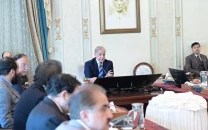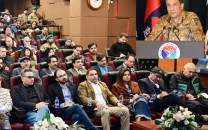‘Cipher’s was an open-and-shut case’
Special Court declares that Imran Khan violated his oath by unveiling a classified information

The Special Court which on Tuesday convicted former prime minister Imran Khan and former foreign minister Shah Mahmood Qureshi has declared that disclosure of a diplomatic cipher by the PTI’s leaders “adversely affected” Pakistan and benefited foreign powers.
"It is quite clear from the evidence brought on record that by compromising the integrity of the cipher communications system of Pakistan, the accused, Imran Ahmed Khan Niazi, in connivance with the accused, Shah Mehmood Qureshi has compromised Pakistan's international standing…
“[They have also undermined], the credibility and standing of our diplomats and diplomacy with adverse implications for our future diplomatic reporting culture,” said the written verdict issued by the Special Court Judge Abual Hasnat Muhammad Zulqarnain on Thursday.
The judge on Tuesday sentenced both Imran and Qureshi to ten years in prison at the conclusion of a trail based on allegations that the former PM and foreign minister misused and later misplaced a diplomatic telegram ahead of a no-confidence motion against their government in March 2022.
The verdict said Pakistan clearly faced consequences of this disclosure of the telegram
“It is evident that Pakistan has faced serious economic, diplomatic and political consequences due to the offences committed by the accused Imran and Qureshi, which in turn weakened Pakistan's economy thus, adversely affecting the national security.”
The judgement noted that it was an open-and-shut case in which receipt of the cipher message along with chain of custody was proved through tangible evidence supported by cipher movement registers.
“Moreover, in the light of the statement of Azam Khan, the then Secretary to the PM, unauthorized retention of [the] cipher even after his advice [and] negligent handling of [the] telegram containing [the] cipher message is also proved.”
It said there were statements of three witnesses other than the investigation officer which said that disclosure of the cipher had adverse effects. “[The] learned prosecutors relied upon statements of Mr Asad Majeed, the then ambassador [to the US], Sohail Mehmood, ex-foreign secretary and Faisal Niaz Tirmizi,” it added.
The verdict said the former prime minister did not deny that he waved the telegram at a public rally on March 27, 2022 and disclosed its content before the public at large.
“[The] factum of benefit to foreign power is to be evaluated in the light of attending circumstances and this fact is to be inferred, they emphasized the word “calculated” used in the relevant provision,” it said.
The verdict said there falls a heavy responsibility on the prime minister as he becomes privy to the most confidential information concerning the state.
“The Constitution requires a person occupying the high office of the Prime Minister to act in the most responsible manner and absolutely refrain from doing anything which undermines the interests of Pakistan.
“Sadly, the accused Imran Ahmed Khan Niazi, besides committing offences under the Official Secrets Act, 1923 has also violated his oath," the order said.
The court also took exception to the “tricky” behavior adopted by Imran and Qureshi during the trial.
Discussing their conduct, the judge noted both the accused were represented through a number of lawyers but during the entire proceedings they played hide and seek just to prolong the proceedings.
“They just played hide and seek and considered the entire proceedings in a [mocking] manner which is not warranted by law and twisted their various stances by way of filing different applications just in order to protract these proceedings,” it added.



















COMMENTS
Comments are moderated and generally will be posted if they are on-topic and not abusive.
For more information, please see our Comments FAQ